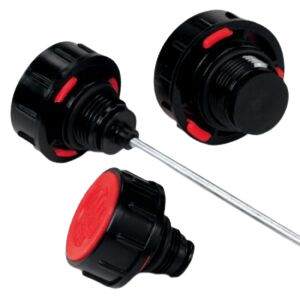In the world of hydraulics, choosing the right components directly impacts the efficiency, safety, and longevity of systems. Among these, metal or plastic filler and breather caps: differences, advantages, and applications are a crucial topic for those configuring or maintaining power units and tanks. Filler and breather caps serve an essential function: they allow fluid filling and venting, preventing overpressure, contamination, or vacuum conditions that could compromise the system.
The choice between plastic or metal materials depends on several factors, such as operating conditions, fluid type, temperatures, and pressures involved. Plastic models, for example, are ideal for applications where light weight and corrosion resistance are key. Metal caps, on the other hand, provide mechanical strength and greater durability in demanding environments.
The LubeTeam Hydraulic catalog offers a wide selection of Filler and breather caps, designed to suit various configurations and ensure maximum reliability, whether for compact systems or complex industrial setups.

When to choose plastic or metal filler and breather caps
The use of filler and breather caps requires careful evaluation of the application context. Plastic caps offer numerous advantages, especially in corrosive environments where metal materials may deteriorate over time. Additionally, plastic components are lightweight and often more cost-effective, making them ideal for mobile systems or compact power units.
Metal filler and breather caps, available in the Metal filler and breather caps range, are known for their high mechanical strength and ability to operate in extreme environmental conditions. These components are preferred in industrial settings with high operating pressures, elevated temperatures, or exposure to shocks and vibrations.
A key aspect to consider is the type of fluid used in the system. Some oils or special fluids require materials with specific chemical resistance, which may differ between plastic and metal. Additionally, it is always advisable to check for the presence of integrated filters or valves in the caps, which help maintain fluid quality by preventing external contamination.
Finally, maintenance also affects the choice: caps with easy open/close systems can speed up routine operations, improving productivity and reducing downtime.
Advantages and key points of metal or plastic filler and breather caps
- Plastic versions offer lightness, corrosion resistance, and lower costs
- Metal versions ensure mechanical strength and long-term durability
- The choice depends on pressure, temperature, and fluid type
- Caps may include valves or filters to enhance performance
- Essential for system safety, efficiency, and protection
- Wide range of solutions available in the LubeTeam Hydraulic catalog

